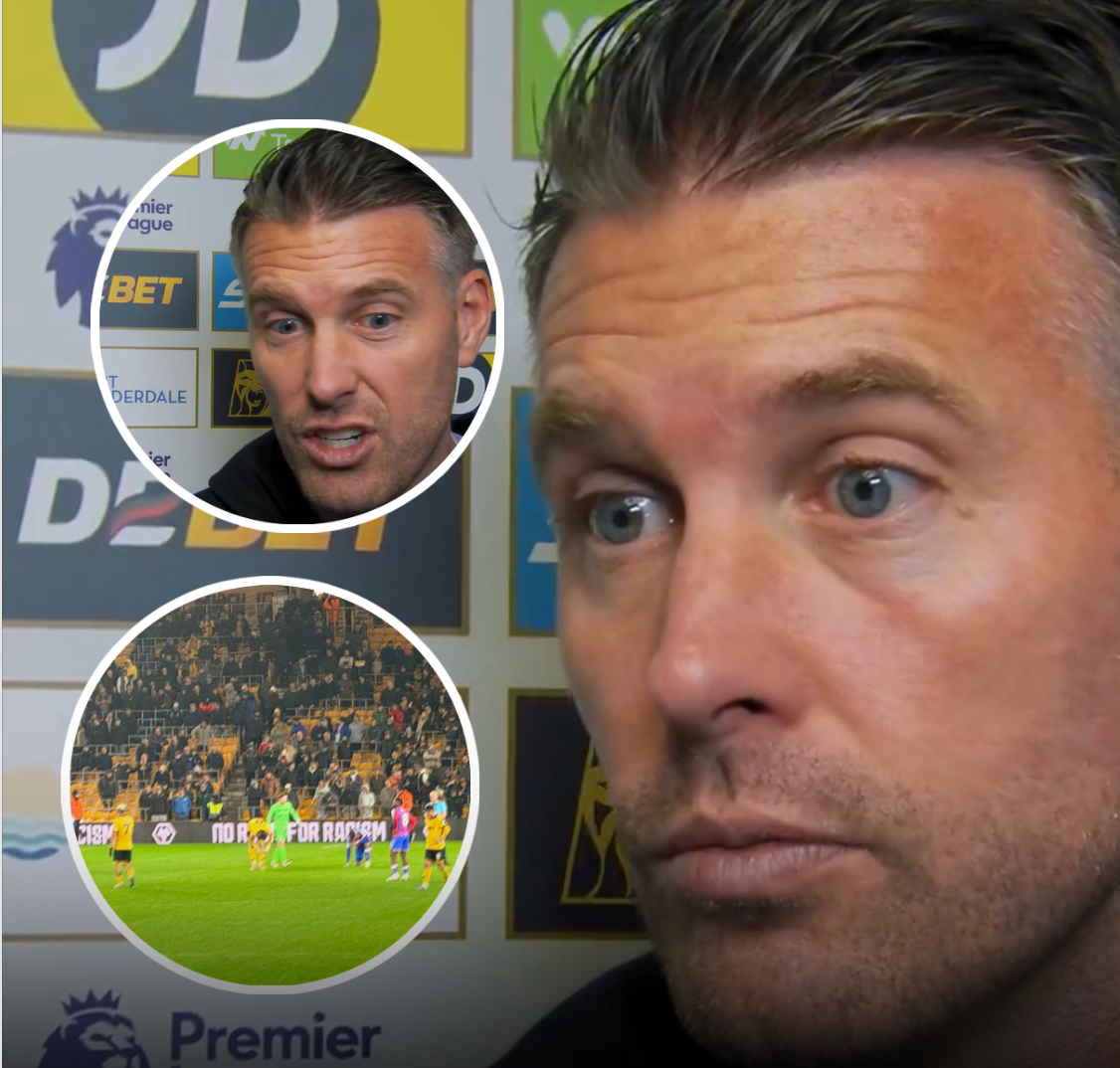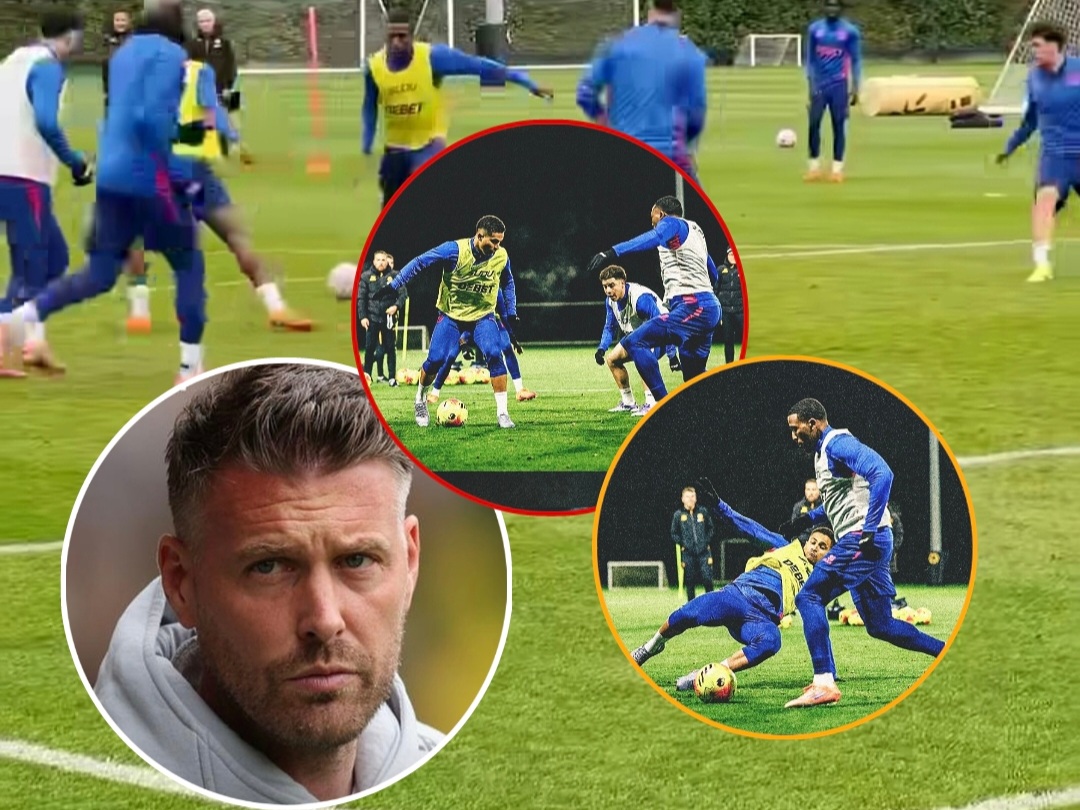ROBS EDWARD ACCUSED OF THROWING WOLVES PLAYERS ‘UNDER THE BUS’ AFTER FIRST GAME IN EXPLOSIVE INTERVIEW
Wolverhampton Wanderers expected a fresh spark, a jolt of new belief, and a shift in mentality when Robs Edward took charge of his first game. Instead, fans were left stunned, pundits were left debating, and players were left in the firing line after Wolves fell to a deflating 0–2 defeat against Crystal Palace — a match overshadowed not by the performance on the pitch, but by Edward’s explosive post-match interview.
For a first outing, many anticipated a manager who would call for patience, unity, and time. What they got was a fiery assessment that has sparked immediate controversy, with large sections of supporters and analysts accusing him of “throwing the players under the bus” barely 90 minutes into his tenure.
What should have been a night focused on tactics, transition, and the beginning of a new era for Wolves quickly turned into one of the most talked-about interviews of the season.
A Debut to Forget — Wolves’ Performance Breakdown
From the moment the whistle blew, Wolves looked like a side struggling to adjust. The new system introduced by Edward appeared bold on paper, built around high pressing and structured transitions, but the execution never matched the plan.
Crystal Palace took full advantage.
First Half: Chaotic and Unsettled
Wolves couldn’t keep the ball, couldn’t track runners, and couldn’t maintain shape. Palace’s midfield enjoyed far too much freedom, exposing Wolves repeatedly through the channels. The first goal came after a sloppy turnover that symbolised the entire half: slow reactions, poor recovery, and no sense of urgency.
Second Half: Slightly Better, Still Not Enough
Although Wolves showed glimpses of improvement after the break, the second goal from Palace felt inevitable. Defensive lapses, communication issues, and individual errors piled up, leaving Edward visibly frustrated on the touchline.
But no one expected what came next.
The Interview That Set the Club Alight
Managers facing defeat on their debut usually adopt a diplomatic tone. They might praise effort, ask for patience, or take responsibility. Instead, Robs Edward delivered an interview that felt more like a public dressing-down of his squad.
Speaking with an intensity that caught even the interviewer off guard, Edward said his players “didn’t follow instructions,” “didn’t show enough fight,” and “lacked professionalism in key moments.”
He added that several individuals “looked like they weren’t ready to play Premier League football tonight.”
That sentence alone sent shockwaves across the Wolves fanbase.
Social media erupted immediately. Fans were split, but the loudest voices accused him of going too far, too soon.
Fan Backlash: ‘This Isn’t How You Build Trust’
Within minutes, hashtags questioning his man-management were trending among Wolves supporters. Many argued that:
- He should have taken responsibility first
- Public criticism before establishing trust is dangerous
- Calling players out individually without naming them is still a damaging tactic
- Such comments risk losing the dressing room on day one
Others defended him, saying the squad needed a “wake-up call,” but the majority agreed one thing:
The interview overshadowed everything else.
Pundit Reaction: Shock, Concern, and a Few Warnings
Football pundits across TV, radio, and online platforms didn’t hold back.
One former Premier League player described the interview as “a grenade lobbed into his own dressing room.”
Another said Edward had “misjudged the moment massively in his first game.”
The most repeated concern was that Wolves’ players might now feel publicly blamed rather than collectively supported.
Managers with decades of experience weighed in, noting that relationships between players and coaches are fragile, and respect must be earned before criticism can be delivered.
The fear is simple:
Has he damaged trust before he even built any?
Why Edward’s Words Carry Extra Weight
In modern football, a manager’s language is everything. With Wolves trying to rebuild after inconsistency, instability, and fan frustration, the appointment of Robs Edward was meant to represent a new start — calm, controlled, thoughtful leadership.
But Edward’s interview suggested a very different approach.
Rather than easing into the challenge, he set a tone of confrontation. Some analysts believe he was trying to send a message, attempting to establish authority early. But critics argue he misread the psychology of the squad.
A first game is usually the moment to unify.
Edward instead created distance.
Inside the Dressing Room: Early Tension Reported
Sources around the club suggest the atmosphere after the match was “tense, uncomfortable, and very quiet.”
Although there were no visible clashes, players reportedly felt singled out by the comments. Some were described as “surprised,” others “disappointed,” and a few “angry.”
Players typically expect honest criticism — but behind closed doors, not in front of millions of viewers.
Team leaders are believed to have held brief internal discussions following the interview, with the main sentiment being that the squad wants clarity and fairness, not public blame.
Did Edward Intend to Send a Message?
There is a theory among analysts that Edward’s outburst wasn’t accidental.
Some believe it was a calculated move — an attempt to shake the squad, assert dominance, and show he won’t tolerate poor standards.
The idea is that he wants to reset the mentality quickly, even if it risks backlash.
But even those who support this theory admit it is a very risky strategy, especially for a new manager who hasn’t earned deep trust from the squad or the fanbase yet.
Where Wolves Go From Here
A turbulent debut doesn’t have to define a season — or a manager. But Edward now faces an uphill battle:
1. Rebuilding Dressing-Room Confidence
Players need to believe their manager supports them, even in difficult moments. Edward must work overtime in training, meetings, and personal conversations to repair the emotional hit caused by the interview.
2. Clarifying His Football Vision
Tactically, Wolves looked disconnected. The system needs refinement, communication, and confidence. The structure Edward wants must be explained clearly with patience.
3. Winning the Fans Back
Supporters wanted honesty, but many felt he crossed the line. His next press conference will be crucial. Tone, humility, and accountability will matter.
4. Performing in the Next Match
Football is simple: results can fix narratives. A strong performance in the next fixture could change the mood instantly.
But another loss — especially with more controversial comments — could escalate this tension into a full-blown crisis.
Is This a Sign of Bigger Issues?
A manager’s first interview reveals a lot:
- Personality
- Leadership style
- Emotional control
- Communication method
- Approach to pressure
If Edward continues down this path, Wolves may be in for a season filled with dramatic pressers and internal tension. Some fans compare it to past managers known for fiery, confrontational media styles — but even those managers typically waited before publicly criticising their squad.
The concern is simple:
He may have shown too much, too soon.
Conclusion: A Debut That Will Be Remembered for All the Wrong Reasons
Robs Edward’s first match in charge should have been an introduction to his footballing philosophy, not a spotlight on dressing-room tension. The defeat was disappointing — but the interview ignited a storm that now surrounds his reign from day one.
Whether he lost the dressing room, motivated the squad, or simply made a mistake heated by emotion, only time will tell. What is clear is that Wolves find themselves not just dealing with a poor result, but with a rapidly growing narrative of conflict, blame, and pressure.
This was supposed to be a fresh start.
Instead, it has become one of the most controversial managerial debuts of the Premier League season.
And the whole football world will be watching what Robs Edward does next.








Post Comment